The Iraq War began in 2003 and involved a two-phase conflict comprising an initial invasion of Iraq led by U.S. and UK forces and a longer, eight-year phase of occupation and fighting with insurgents.

Izzat Ibrahim al-Douri was an Iraqi politician and Army Field Marshal. He served as Vice Chairman of the Iraqi Revolutionary Command Council until the 2003 U.S. invasion of Iraq and was regarded as the closest advisor and deputy under President Saddam Hussein. He led the Iraqi insurgent Naqshbandi Army.

An improvised explosive device (IED) is a bomb constructed and deployed in ways other than in conventional military action. It may be constructed of conventional military explosives, such as an artillery shell, attached to a detonating mechanism. IEDs are commonly used as roadside bombs, or homemade bombs.

An insurgency began in Iraq after the 2003 US-led invasion, and lasted throughout the ensuing Iraq War which lasted from 2003 until 2011. The first phase of the insurgency began shortly after the 2003 invasion and prior to the establishment of the new Iraqi government. From around 2004 to May 2007, Iraqi insurgents primarily targeted the American-led coalition forces, and later also targeted Iraqi security forces.

The Badr Organization, previously known as the Badr Brigades or Badr Corps, is an Iraqi Shia Islamist political party and military organization headed by Hadi Al-Amiri. The Badr Brigade was the Iran-officered military wing of the Iran-based Shia Islamic party, Supreme Council for Islamic Revolution in Iraq (SCIRI), formed in 1982. The Badr Brigade was created by Iranian intelligence and Shia cleric Mohammad Baqir al-Hakim with the aim of fighting Saddam Hussein's regime during the Iran–Iraq War. Since the 2003 US-led invasion of Iraq most of Badr's fighters have entered the new Iraqi army and police force. Politically, Badr Brigade and SCIRI were considered to be one party since 2003, but have now unofficially separated with the Badr Organization now an official Iraqi political party. Badr Brigade forces, and their Iranian commanders, have come to prominence in 2014 fighting the Islamic State of Iraq and the Levant (ISIL) in Iraq. It is a part of the Popular Mobilization Forces.
Al-Qa'im is an Iraqi border town located nearly 400 km (248 mi) northwest of Baghdad near the Syrian border and situated along the Euphrates River, and located in the Al Anbar Governorate. It has a population of about 74,100 and it's the center of the Al-Qa'im District.
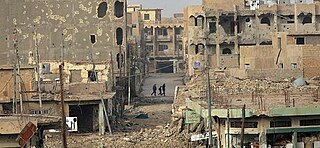
The Iraqi civil war was a civil war fought mainly between the Iraqi government along with American-led coalition forces and various sectarian armed groups, mainly Al Qaeda in Iraq and the Mahdi Army, from 2006 to 2008. In February 2006, sectarian tensions in Iraq escalated into a full-scale civil war after the bombing of the Al-Askari Shrine by the Sunni organization Al-Qaeda in Iraq. This set off a wave of reprisals by Shia militants on Sunni civilians, followed by Sunni counterattacks on Shia civilians. In 2006, the Secretary General of the United Nations declared that if patterns of discord and violence continued to prevail, the Iraqi state was in danger of breaking up. In a 10 January 2007 address to the American people, President George W. Bush stated that "80% of Iraq's sectarian violence occurs within 30 miles (48 km) of the capital. This violence is splitting Baghdad into sectarian enclaves, and shakes the confidence of all Iraqis.". The conflict escalated over the next several months until by late 2007, the National Intelligence Estimate described the conflict as having elements of a civil war. In 2008, during the Sunni Awakening and the U.S. troop surge, violence declined dramatically. However, an insurgency by Al-Qaeda in Iraq continued to plague Iraq following the U.S. withdrawal from the country in late 2011. In June 2014 the Islamic State of Iraq and the Levant, the successor of Al-Qaeda in Iraq, launched a major military offensive in Iraq and declared a self-proclaimed worldwide Islamic caliphate, leading to a full-scale war mainly between Iraq and ISIL from 2013 to 2017 in which Iraq declared full victory against the terrorist group.
Iraqi civil war may refer to:
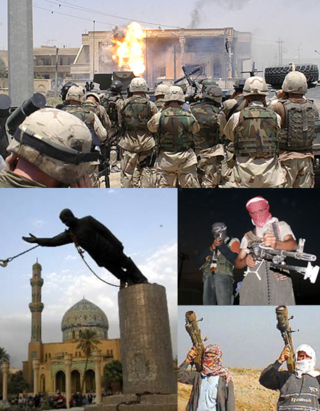
The Iraq War was a protracted armed conflict in Iraq from 2003 to 2011 that began with the invasion of Iraq by the United States-led coalition that overthrew the Iraqi government of Saddam Hussein. The conflict continued for much of the next decade as an insurgency emerged to oppose the coalition forces and the post-invasion Iraqi government. US troops were officially withdrawn in 2011. The United States became re-involved in 2014 at the head of a new coalition, and the insurgency and many dimensions of the armed conflict continue today. The invasion occurred as part of the George W. Bush administration's War on terror following the September 11 attacks, despite no connection between Iraq and the attacks.

The war on terror, officially the Global War on Terrorism (GWOT), is an ongoing international counterterrorism military campaign initiated by the United States following the September 11 attacks. The main targets of the campaign are militant Islamist and Salafi-Jihadist armed organisations such as Al-Qaeda, the Islamic State and their international affiliates; which are waging military insurgencies to overthrow governments of various Muslim countries.

The combatants of the Iraq War include the Multinational Force in Iraq and armed Iraqi insurgent groups. Below is a list of armed groups or combatants that participated in the Iraq War of 2003–2011.

The Islamic State of Iraq, also called al-Qaeda in Iraq, is a militant Salafist jihadist group that aimed to establish an Islamic state in Sunni, Arab-majority areas of Iraq during the Iraq War and later in Syria during the Syrian Civil War.

The spillover of the Syrian Civil War is the impact of the Syrian Civil War in the Arab world and beyond. Since the first protests during the Arab Spring, the increasingly violent Syrian Civil War has been both a proxy war for the major Middle Eastern powers, Turkey and Iran, and a potential launching point for a wider regional war. Fears of the latter were realized when the Islamic State of Iraq and the Levant (ISIL), a Salafi Jihadist militant group and alleged former al-Qaeda affiliate, established itself in Syria in 2013, and later combined with the War in Iraq (2013–2017) into a single conflict the following year. The spillover of the Syrian Civil War is often dubbed the Arab Winter.
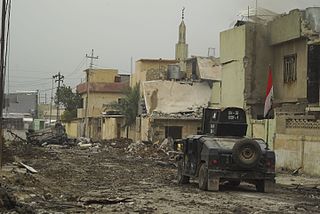
The War in Iraq was an armed conflict between Iraq and its allies and the Islamic State which began in 2013 and ended in December 2017. Following December 2013, the insurgency escalated into full-scale guerrilla warfare following clashes in the cities of Ramadi and Fallujah in parts of western Iraq, and culminated in the Islamic State offensive into Iraq in June 2014, which lead to the capture of the cities of Mosul, Tikrit and other cities in western and northern Iraq by the Islamic State. Between 4–9 June 2014, the city of Mosul was attacked and later fell; following this, Prime Minister Nuri al-Maliki called for a national state of emergency on 10 June. However, despite the security crisis, Iraq's parliament did not allow Maliki to declare a state of emergency; many legislators boycotted the session because they opposed expanding the prime minister's powers. Ali Ghaidan, a former military commander in Mosul, accused al-Maliki of being the one who issued the order to withdraw from the city of Mosul. At its height, ISIL held 56,000 square kilometers of Iraqi territory, containing 4.5 million citizens.

The departure of US troops from Iraq in 2011 ended the period of occupation that had begun with the U.S.-led invasion in March 2003. The time since U.S. withdrawal has been marked by a renewed Iraqi insurgency and by a spillover of the Syrian civil war into Iraq. By 2013, the insurgency escalated into a renewed war, the central government of Iraq being opposed by ISIL and various factions, primarily radical Sunni forces during the early phase of the conflict. The war ended in 2017 with an Iraqi government and allied victory, however ISIL continues a low-intensity insurgency in remote parts of the country.
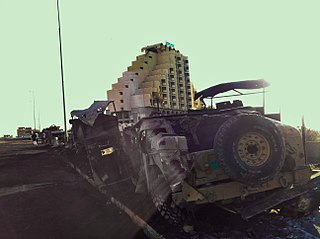
The Fall of Mosul occurred between 4–10 June 2014, when Islamic State insurgents, initially led by Abu Abdulrahman al-Bilawi, captured Mosul from the Iraqi Army, led by Lieutenant General Mahdi Al-Gharrawi.
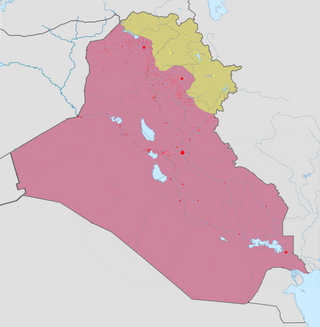
The Iraqi conflict is an armed conflict that began with the 2003 invasion of Iraq by a United States-led coalition that toppled the government of Saddam Hussein. The conflict continued as an insurgency emerged to oppose the occupying forces and the post-invasion Iraqi government. The United States officially withdrew from the country in 2011 but became reinvolved in 2014 at the head of a new coalition. The main phase of the conflict ended following the defeat of the Islamic State of Iraq and the Levant (ISIL) in the country in 2017, but a low-level ISIL insurgency is ongoing in the rural north parts of the country.
The history of the Islamic State began with the group's foundation in 1999 by Jordanian Salafi jihadist Abu Musab al-Zarqawi under the name Jamāʻat al-Tawḥīd wa-al-Jihād. In a letter published by the US State Department in February 2004, Zarqawi wrote that jihadists should use bombings to start an open sectarian war in Iraq so that Sunnis from other countries would mobilize against the assassinations carried out by Shias, specifically the Badr Organisation, against Ba'athists and Sunnis. The Islamic State would eventually grow to control territory with a population of millions.












